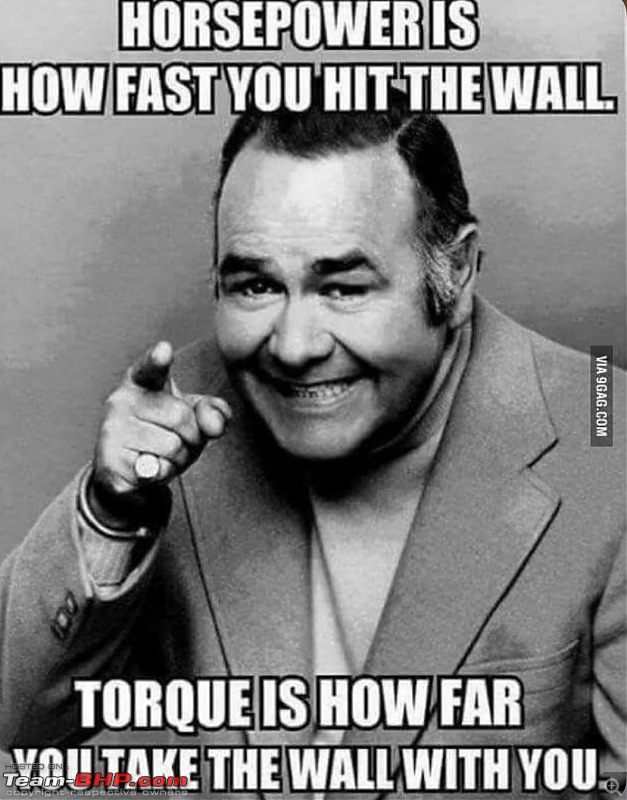| |||||||
| Search Forums |
| Advanced Search |
| Go to Page... |
 |
| Search this Thread |  42,938 views |
| | #1 |
| Senior - BHPian Join Date: Mar 2019 Location: Kerala
Posts: 1,994
Thanked: 7,376 Times
| Horsepower vs Torque and the loose talk that comes with it Note: This post is intended to explain a concept to beginners without much of an engineering background so it might be a bit too oversimplified for the mechanical engineers among you. All enthusiasts whether they be of the car, bike, airplane, boat or lawnmower variety has heard the phrase "Horsepower sells cars but torque wins races" What if I tell you that this very phrase itself was made up by some clever salesman or advertising agency to sell cars and mislead people? Anything with an engine is subject to comparisons and debate among people who are interested in it. This can range from casual bragging in coffee shops and bars about whose car is better; to intense, cuss filled debates at 3am in the youtube comment section on a video of some obscure quadricycle from Taiwan. The horsepower vs torque debate is almost always at the forefront of these discussions. "Oh your car has only 90hp"? "Yeah but it has 220nm torque so it's faster than you think" "My crossover has 103hp  " ""Oh but it has only 134nm of torque? That's just too low. Can it even handle a 5 passengers? Going up a hill?" "My bmw has 250hp and 350nm of torque" "Well my mercedes is a torque monster with 440nm so the horsepower being 190hp doesn't matter" etc You have already seen the equation for horsepower many times : Horsepower = (Torque * RPM) / 5252 Where torque is in Lb.Ft OR Horsepower = (Torque * RPM) / 7127 Where torque is in our more familiar newton meters (nm) I know, I know, math is boring and half of us have our eyes glaze over while looking at equations. Things would be way easier if it was just a bar graph so we can go back to comparing Fortuner vs Endeavour power figures. Bigger number good. Smaller number bad. So let's change the way we look at this. We are all familiar with plots of land, yes? A plot of land is measured by its area. The bigger the area, the more space you actually have to build structures etc. Everyone would like more area. The more area you have, the more the value of the land. Well depending on the locality. For the sake of simplifying this example, let's consider all plots of land to be rectangular shaped So Area = length * width. 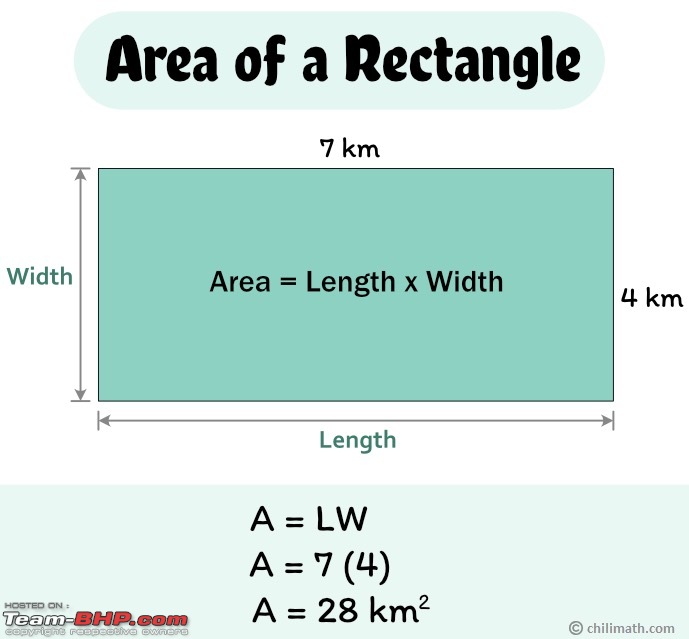 Now length and width can be different numbers. Sometimes, the length is more. Sometimes the width is more. Sometimes it's completely equal and your plot is a square. Now imagine someone comes up to you and claims area is meaningless. He says length is what is actually important. He says plots of land with more length is better and he gives you an example of 2 plots of land. One with 60m length and 25m width and another with 50m length and 27m width. He says that plot 1 is more valuable than plot 2 because the length is more. Now area of plot 1 = 60 x 25 = 1500 square meters area of plot 2 = 50 x 27 = 1350 square meters Now clearly the extra value is because the overall area of plot 1 is more. But he is adamant that it's because of the extra length and that area is just some figure made up by real estate agents. Now someone else says that his land is worth much more because it's 70m long. He owns a plot of land that is 70m long and 50m wide. His total area is 3500m squared. The reason it's worth more is because the overall area is way more. Not because of the length being more. Another guy has a 50m long stretch of land with 2m width. Area of his land is 100 square meters. Meanwhile you have a plot of land that is 150 square meters. It's 15m long and 10m wide. He says what are you even going to do with land that is just 15m long? That's way too low. He doesn't even know what width or area is. You show them all a plot of land that is 30m long and 200m wide. You show them how the value of this land is way more. They stand around scratching their heads trying to come up with an explanation for why some land with just 30m length is worth more instead of accepting that overall area is what actually matters and thus width needs to be taken into consideration too. Saying you own land that stretches 500m from here to there might feel good. But in the end, if it is just 1m wide, it is useless other than for some very niche applications. Like parking a bunch of scooters end to end. Maybe if you are starting an electric recharging station, it might be useful. But for all other practical purposes, it is useless. Same for land that is 500m wide and 1m long. 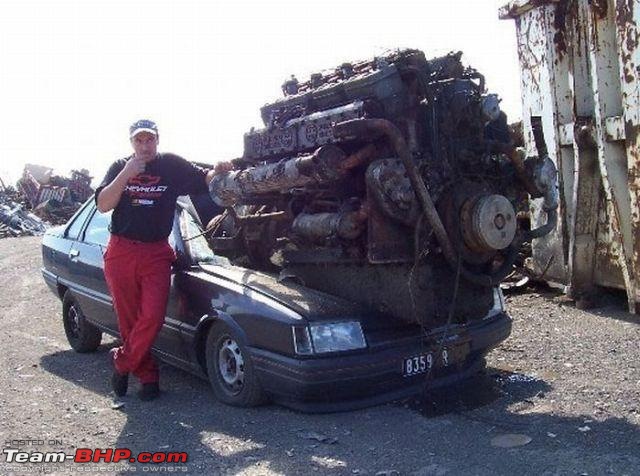 Now back to cars and our torque conundrum: Horsepower = (Torque * RPM) / 7127 The equation itself is pretty simple. It says that horsepower is directly proportional to torque and rpm. In other words, if either torque or rpms increases, then horsepower also increases. If you are designing an engine and need it to make more power, whether it is for better acceleration, higher top speed, going offroading, up steep mountains, carrying more weight, towing: then you can either : increase the torque, or increase max RPMs. Theoretically, either of these will do but practically, there is one major drawback that I will get to later. Either of these will increase horsepower which is the actual measure of work being done and you can then just gear the car appropriately for acceleration/speed/towing capacity etc. If you get yourself a car with 100nm of torque at redline and it can rev all the way to 9000 rpm, it will make 126 hp. If you get yourself a car with 250nm of torque at redline and it can only rev to 4000rpm, then it will make 140 hp. You will see how the power figures are similar despite one engine making 2.5x more torque. Now that this part is clear, let's move on to the more interesting part. Engines do not produce the same amount of torque across the entire rpm range. It changes along with the RPM.  "Wait what? So when the rpm changes, torque changes as well as horsepower?" That's right. This is why cars are listed with peak torque + what rpm it can make said torque. In the diagram above, you can see that torque (darker line) isn't just a straight line. It increases and decreases. This 2.6l engine from mazda makes around 120nm of torque at 1000rpm (idle) and then increases to around 210nm at around 5500 rpm and then decreases as the rpm keeps increasing to end at 190nm at 8500rpm (redline). "So does this car produce max acceleration/towing power when driving at 5500rpm?" No, that's another often seen misconception. Even as the torque decreases, the rpm increase is so much that horsepower keeps increasing, up to 8200rpm where the horsepower line also starts to go down. This is because torque starts falling sharply, more than the RPM increase can counter. So around 8200rpm is where the car produces maximum power and thus that will be where it can pull the most weight or accelerate hardest. Reving past this point will actually lead to power decreasing. 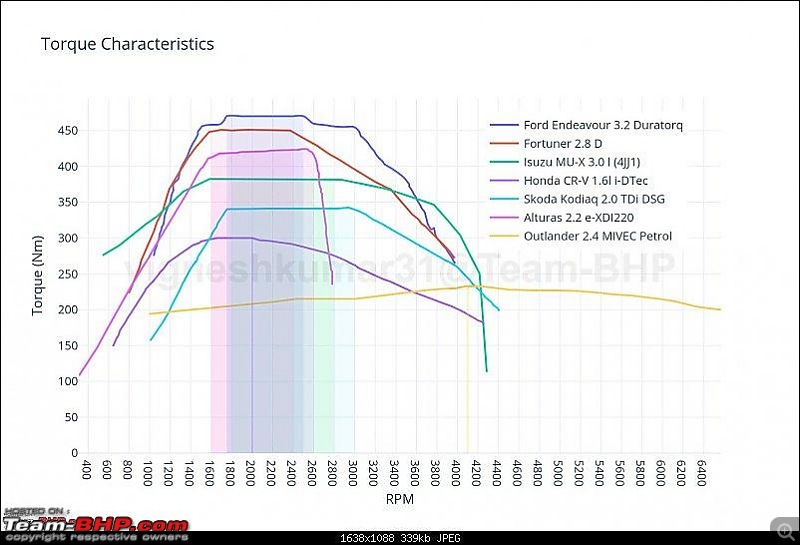 Here is a torque graph of popular SUVs. You can see how the torque changes according to the RPM changing. All of them start out pretty low at idle, goes up sharply and forms a peak due to the turbo and then falls off sharply as well. The outlander 2.4 is an exception because it is naturally aspirated and a petrol. It has a very linear torque curve and redlines much higher at 6400rpm. 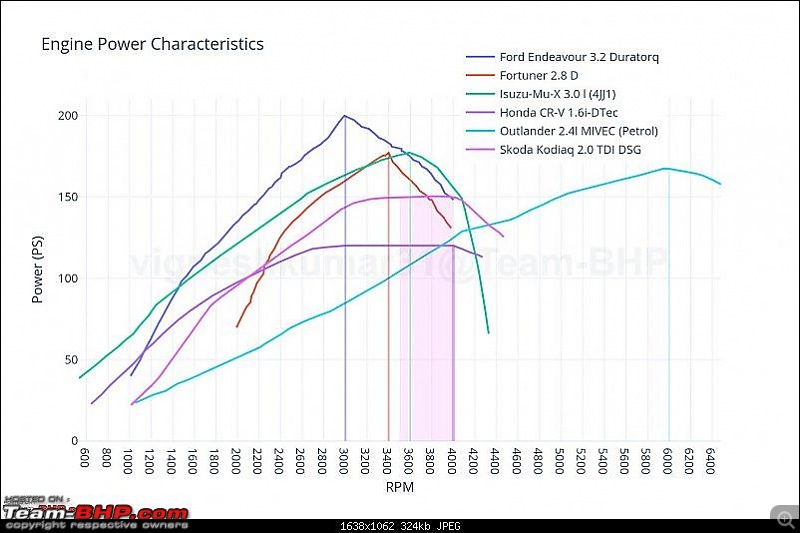 You might have also noticed that the car with the lowest torque is not the car with the lowest power. This change in torque according to rpm means that it also leads to a sharp increase and decrease in power for the turbo diesel SUVs. This is why experienced drivers will tell you to upshift faster in a diesel and why dieselheads will tell you not to go to redline unless you just want a whole lot of smoke and noise without much go. You might have experienced this yourself when you tried to drive a diesel SUV fast. Real world example: In the case of the Endeavour 3.2, you make highest torque (peak torque) from 1800-2500rpm. But highest power is made at 3000rpm, meaning around this is where the car can pull the most weight and accelerate hardest. In the case of the Outlander petrol, this limitation is higher up, letting you go almost all the way to redline without any loss in power. And that is where the CVT will hold the rpms if you go full throttle, giving you that hated boooooom sound associated with CVTs. But also giving you decent power and acceleration from a 2.4L NA engine. Meanwhile, the CRV and Kodiaq diesel make less power than the Outlander despite having much more torque. 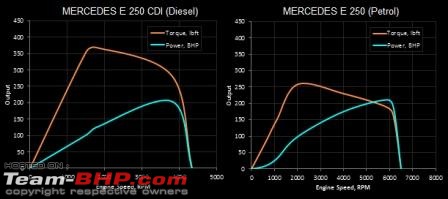 Apologies for the poor quality image but this is the power and torque curve of a a mercedes E250 diesel and E250 petrol. You might notice that the diesel makes much more torque than the petrol. However, the petrol produces more power due to it being able to rev higher. 220 hp at 6000rpm (petrol) vs 200 hp at 3700 rpm (diesel). However, when you take off gently from a stop light, you start off at around 1000rpm. Which car makes more power at 1000rpm? Looking at the graph, we can say that the diesel makes around 70hp due to it also making around 250lbft torque at 1000rpm. While the petrol makes only around 25hp due to it's lower 125lbft torque at 1000rpm. So when you are starting off normally, there is a lot more power available for the diesel. Which is why torquier cars feel faster under normal driving conditions. However, if you floor the gas pedal, the diesel will have only 200hp vs the petrol's 220hp, meaning it will be slower in an extended drag race. The petrol will also rev up faster due to it's lighter internals. Your 400nm diesel SUV doesn't feel effortless taking off in 3rd gear at idle just because the high torque numbers mean that horsepower is irrelevant, its because the high torque numbers mean it produces higher horsepower at lower rpm. Now on to the limitation I mentioned earlier. 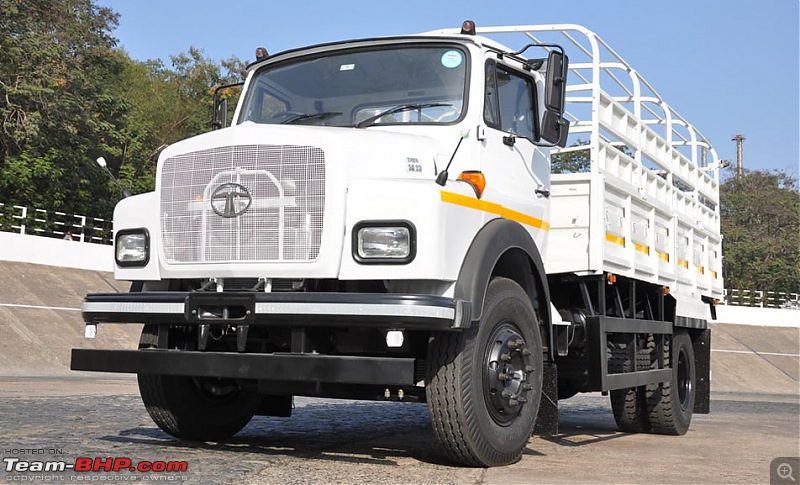 This is a Tata SE 1613. It has a 5.7L engine producing 136 HP of power and 490 Nm of maximum torque. Now you might wonder what's the point of using such a large engine if it can barely make 136hp. Well that's because it can produce it right at 2400rpm. "Well that's still not very impressive. Why did you choose this old truck when there are plenty of newer Tata trucks with 300hp and 1100nm of torque from 1100rpm like the Tata Signa?" Well, I chose this as an example because even with these low power figures, it can still carry 16 tons. This is due to gearing. With low enough gearing, you can carry large loads even with low power figures. It's not going to be fast, and it can barely reach 80kmph, but it will keep chugging along. This is for the offroaders who claim they can't go offroad without massive power figures or the people worrying about whether their small crossover will not be able to climb hilly roads because the power figures are too low. Oh it will climb them alright, you just won't be breaking the speedlimit while doing so. People have been driving on steep hills with less power for ages, you won't be stranded at the bottom. Just don't forget to downshift and rev it up. Now then why can't we just use a high revving, smaller, lower torque engine that makes the same horsepower in trucks? Well theoretically, you could if the gearing was low enough. But imagine trying to start off with a full load at 6000 rpm. Even ignoring the wear on the clutch, there would be the overall inefficiency of having your engine run at 6000 rpms or higher throughout the journey to make the required power. Practically though, it would just bend the internals from trying to move the extreme weight since you need lighter engine components such as pistons and crankshafts to reach high rpms. Likewise, the heavy engine of a truck cannot be tuned to reach high rpms because the pistons and other components are built so heavy to withstand the massive loads. The pistons have such momentum to them that they cannot reverse directions fast enough for the engine to rev up anywhere near the redline in a car. Now a little bit about electric motors:  This is the torque curve for a bunch of Teslas. Notice anything interesting? Every single one of them has the torque start out max right from idle. There is no increasing torque with RPM like in a petrol or diesel engine here, maximum torque is available right from the start and it continues in a flat line for quite a while. This is why these electric cars accelerate so fast from a stop and then gradually fizzle out at higher speeds as the torque and later power drops. This instant torque also means that electric offroaders would really change the game. No more shifting to low range and having to rev up, no more having to maintain a faster speed than you would like to keep the engine in it's power band. You could control your low speed with utmost precision so you can crawl over obstacles without facing any lack of power. No more breaking your side boards rock crawling on a steep climb. Doesn't sound too exciting? Well no worries, you can always use a cheap ICE offroader for fun without worrying about damage so we can have the sounds and thrill associated with it. This is not an electric vs ICE car thread anyway.  This is the dyno results of an old toyota prius hybrid. Dyno charts for hybrid and electric cars aren't always accurate due to the different nature in which they produce power. A useful observation here is that torque is max right at the start because of the electric motor but power keeps increasing with RPM due to the petrol engine reving up. There is no conventional transmission in a toyota hybrid. E-CVT is about as similar to CVT as email is to mail. There are no belts or pulleys or clutches, just a simple planetary gearset. The engine cannot provide more torque to the wheels by "downshifting" so what it does is spin faster to generate more electricity for the electric motor, which will then provide the torque to the wheels necessary to get moving. At higher speeds, engine speed will gradually match the wheel speed. This is a complex design that requires an entire thread to explain properly so I will just leave it at this oversimplified explanation. If people are interested, I will make another thread to explain Toyota hybrids and their changes across the generations. Hopefully all of this helps you understand and judge different cars better than just comparing maximum torque numbers. If you want to compare engine performance, the best option is to go test drive it yourself. If you want to do it from the comfort of your home, then a horsepower/torque/rpm graph is a good option that tells you actual meaningful data. Maximum value of torque by itself is useless. Acceleration timings can also help since it also takes the gearbox into account. In conclusion: Horsepower absolutely does win races and sell cars. Last edited by Cresterk : 16th June 2023 at 12:32. |
| |  (198)
Thanks (198)
Thanks
|
| The following 198 BHPians Thank Cresterk for this useful post: | --gKrish--, 16000rpm, aadya, ags82, ajayjoshy, akshye, anivy, Ankur@VNS, anshumandun, aps88, Aquitej, Arbind Ray, argchoff, Arun_S, arvind71181, arvindmanju, ashivas89, asingh1977, astrodex, audioholic, autobahnjpr, AutoNoob, Aviator_guy, AYP, BalaSNKL, bhphog, brt_mhn, BudgetFailure, CarML, Carpainter, cefiljoseph, CentreOfGravity, century, chanz2015, chautob0t, cogWheel, comfortablynumb, commander.sri, condor, CptSlow, Cyborg, CzechItaliaMoto, d3mon, da3mn, deerhunter, delusional_fool, Desmo_nomad, docprashant, Dr ST, Dr.AD, dsnaveen21, DumplingDon, d_himan, Eco_boost, ellip5i5, evil_grin, fabia_firstcar, furyrider, GaryTSI, GeneralJazz, Geo_Ipe, gischethans, GKR9900, gokulamal, Greasy Monkey, grosserimperial, GST, GTO, gungax, gunin, haria, Harjot37, Hayek, imprezzer, InControl, Ithaca, jkrishnakj, Joelinf, jomson13, Juggy, JVH, KarthikK, kiranknair, kishore2019, klgiridhar, KNL_Bandi, koyomi_araragi, KrisTvpm, KumarS, K_Drive, Lalvaz, Livnletcarsliv, Madrasin_selvan, mallumowgli, manim, Maxton07, Meer, mugen_pinaki27, Mustang Sammy, myavu, NannuBhai, natox, nda992, neelkumar, NewUser123, NiInJa, ninteachan, NomadSK, Omkar, One, paragsachania, PearlJam, petrogeek, Piyush_DT, PM - B, poised2drive, prajosh, prashant316, PrasunBannerjee, pratuls, pratyaksh, PVS, qaqa, QuadraticAmoeba, RaceCyborg, Rajeevraj, rajvardhanraje, raptor_diwan, Ravi Parwan, RaviK, realactivex, redohabitat, redruminator, reignofchaos, RJ2285, Rohit94AD, RomanPearce, rt363, rx100, sainyamk95, Samfromindia, samm, sand-dune96, sandeepmohan, sanjayrozario, Saturn-V, SaurAswale, SCORPION, Seenz, sgm, shankar.balan, Shanks_Jazz, shastryBLR, sheelapratosh, shravansp24, siddharthgarg, SlowRider, sole_rider, Sran, SRISRI_90, StepUP!, StrikerK, stringbh, sudeepg, Sumer, sumitdongerkery, sunikkat, swiftLife, t3rm1n80r, Tanmay_868, TechFan, Teesh@BHP, TejasV, ThatRaptorGuy, TheCatalyst, theexperthand, thtechnician, Torq, Torque123, Tpsdhiraj, tri_life, Turbanator, univ_explorer, UtkarshC, vattyboy, Vikram Arya, vineetklkrn, VinsWagen, Voodooblaster, Wanderers, warrioraks, wavingflag, WhiteKnight, wooka, YakubKC, YanTra Makto, Yash390, ysjoy |
| |
| | #2 |
| Team-BHP Support  | Re: Horsepower vs Torque and the loose talk that comes with it Thread moved out from the Assembly Line. Thanks for sharing! |
| |  (2)
Thanks (2)
Thanks
|
| The following 2 BHPians Thank Aditya for this useful post: | SaurAswale, Vikram Arya |
| | #3 |
| BANNED Join Date: Apr 2008 Location: Bangalore
Posts: 11,797
Thanked: 27,220 Times
Infractions: 0/3 (13) | Re: Horsepower vs Torque and the loose talk that comes with it Crester! What a fantastically well put together explanation. Thank you so much for helping set so many people on the right track. I want to only add these simple short YouTube video to further bolster your detailed knowledge sharing session. |
| |  (12)
Thanks (12)
Thanks
|
| The following 12 BHPians Thank shankar.balan for this useful post: | argchoff, chanz2015, Cresterk, Desmo_nomad, DevilzzzzOwn, docprashant, gischethans, Harjot37, Juggy, sanjayrozario, SRISRI_90, Voodooblaster |
| | #4 |
| Distinguished - BHPian  Join Date: Jul 2011 Location: Bombay
Posts: 2,030
Thanked: 16,950 Times
| Re: Horsepower vs Torque and the loose talk that comes with it Very nicely written. One important point you mentioned which many people miss is the importance of the lower inertia in Petrol engines - due to which they can get to a given RPM much faster. To give you an interesting example, my Tiguan Allspace accelerates as or more quickly than my X3 20d, even though it has the same peak power and materially lower peak torque. The importance of gearing is also hugely underestimated by most. I remember comparing the drive of the Honda Accord, with a 2.4 l engine and 185 HP peak power vs the Superb with a 1.8 TSI and 160 HP speak power. The Superb was far superior to drive due to the difference between the 7 speed DSG and the 4 speed TC that the Accord had. |
| |  (22)
Thanks (22)
Thanks
|
| The following 22 BHPians Thank Hayek for this useful post: | anshuman1117, Bibendum90949, cefiljoseph, chanz2015, chautob0t, Cresterk, Desmo_nomad, Dr ST, dsnaveen21, gischethans, grosserimperial, InControl, Juggy, OffRoadFun, paragsachania, PrasunBannerjee, pratyaksh, RaceCyborg, rajvardhanraje, RJ2285, SRISRI_90, Voodooblaster |
| | #5 | ||
| Senior - BHPian Join Date: Mar 2019 Location: Kerala
Posts: 1,994
Thanked: 7,376 Times
| Re: Horsepower vs Torque and the loose talk that comes with it Quote:
Quote:
 And yes, a 4 speed torque converter is an old design from the times when automatics were considered lethargic and slower than manuals. It can't even come close to a fast shifting DSG or other modern automatics which can shift faster than even the best race car driver. Last edited by Cresterk : 17th June 2023 at 19:51. | ||
| |  (7)
Thanks (7)
Thanks
|
| The following 7 BHPians Thank Cresterk for this useful post: | chanz2015, grosserimperial, InControl, Juggy, RaceCyborg, RJ2285, Voodooblaster |
| | #6 |
| BHPian Join Date: Nov 2018 Location: Navi Mumbai
Posts: 335
Thanked: 1,314 Times
| Re: Horsepower vs Torque and the loose talk that comes with it |
| |  (40)
Thanks (40)
Thanks
|
| The following 40 BHPians Thank revsperminute for this useful post: | ags82, akshye, Aquitej, AutoNoob, Bhargav7, Bibendum90949, cefiljoseph, CentreOfGravity, chanz2015, commander.sri, Cyborg, DevilzzzzOwn, Dr ST, dsnaveen21, gck_tourer, imprezzer, InControl, Ithaca, kiranknair, koyomi_araragi, Madrasin_selvan, Mustang Sammy, myavu, ninteachan, Nitish B Shetty, PrasunBannerjee, pratuls, pratyaksh, rajvardhanraje, RaviK, satchit_bhp, StepUP!, Stranger17, sudeepg, Sumer, sunikkat, theexperthand, thtechnician, warrioraks, WhiteSierra |
| | #7 | |
| BHPian Join Date: Feb 2021 Location: Bangalore
Posts: 365
Thanked: 1,871 Times
| Re: Horsepower vs Torque and the loose talk that comes with it Quote:
Key points: 2.0 diesel has high torque but a narrower band, peak torque starts late and ends early. In an ideal world, a zero delay gear shift will shift the gear to get more torque and continue acceleration but there are no such transmission systems in the world. typically, minimum 200-300ms loss with each gear shift. 2.0D also has around 240kg of extra weight (higher inertia)/ 2.0T, despite having a lower peak torque, has an early peak torque and a wider band, lesser gear shifts and also lower weight. 2.0T wins marginally in 0-100 race. Peak torque/power can be very misleading. What matters a lot is the RPM band, also called tuning. 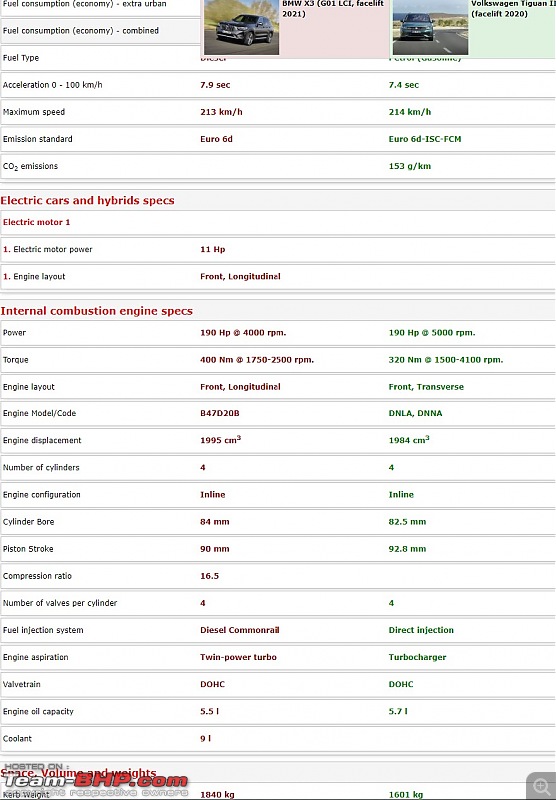 Last edited by OffRoadFun : 18th June 2023 at 13:03. | |
| |  (3)
Thanks (3)
Thanks
|
| The following 3 BHPians Thank OffRoadFun for this useful post: | Dr ST, SlowRider, Voodooblaster |
| | #8 | |
| Distinguished - BHPian  | Re: Horsepower vs Torque and the loose talk that comes with it Thanks for an interesting explanation. Quote:
Dynoís are not very accurate to start with, due to how they measure and calculate the various output values. But I donít understand why the type of propulsion would make a difference. Jeroen | |
| |  (1)
Thanks (1)
Thanks
|
| The following BHPian Thanks Jeroen for this useful post: | Cresterk |
| | #9 |
| Senior - BHPian Join Date: Nov 2015 Location: Mumbai
Posts: 1,241
Thanked: 3,938 Times
| Re: Horsepower vs Torque and the loose talk that comes with it Excellent thread mate. I have contempolated this for a long time, i.e. the RPM at which we should change gears for maximum acceleration. Now as far as a petrol is concerned, you can go all the way to the redline for maximum acceleration(do correct me if I am wrong). However, I am still not sure about the diesels. I have 2 cars at home- 1. Figo 1.5 TDCi- 100 PS@3750 rpm and 215 NM@1500-3000 RPM 2. Jetta 2.0 TDI- 140 PS@4200 rpm and 320 NM@1750-2500 rpm Can you please suggest the best RPM to shift at for maximum acceleration? My apologies if the answer is already present in your post and I am asking the same thing again. Also, is there a way to determine the best RPM to shift gears for max acceleration after looking at the power and torque figures and the RPM at which they are generated? Or do we need graphs to determine this? Thanks. |
| |  ()
Thanks ()
Thanks
|
| | #10 | |
| BHPian Join Date: Jun 2011 Location: Bangalore
Posts: 240
Thanked: 185 Times
| Re: Horsepower vs Torque and the loose talk that comes with it Quote:
With both electric and petrol working in tandem, I suppose we get a much flatter torque output till the max power is reached? Definitely waiting for your detailed hybrid analysis! Last edited by samm : 18th June 2023 at 14:26. | |
| |  ()
Thanks ()
Thanks
|
| | #11 |
| BHPian Join Date: Feb 2006 Location: Bangalore
Posts: 900
Thanked: 2,894 Times
| Re: Horsepower vs Torque and the loose talk that comes with it Cresterk - Finally a great thread on T-BHP after a while. I was tired of reading threads that are unrelated to the automotive sector. I loved reading this and you have put together this topic very well. Could you supplement the post with information around how gearing overall affects the load bearing capacity as well as speed and acceleration? |
| |  (4)
Thanks (4)
Thanks
|
| The following 4 BHPians Thank sudeepg for this useful post: | Cresterk, Desmo_nomad, Harjot37, Lalvaz |
| |
| | #12 |
| Newbie Join Date: Mar 2020 Location: Aligarh
Posts: 6
Thanked: 14 Times
| Re: Horsepower vs Torque and the loose talk that comes with it Hi everyone, I devised a very simple explanation for understanding torque and horsepower for beginners. It might not be perfectly accurate analogy but will help make a clear distinction between the two. I'm assuming you must have ridden a bicycle at some point in your life. So, Consider two scenarios- 1. There's an empty road and you're riding your bicycle on it, you're riding it as fast as you can, but there is still a pace after which you just can't go any faster. You're not able to pedal any faster and have reached your top speed. This top speed is determined by horsepower. The higher "horsepower" you have the faster you'll be able to go. 2. Now consider the same road and the same bicycle, the only change is you're standing still and have to start cycling. So, you start cycling, pushing the pedal with all the force you have to increase your speed, the more force you're able to produce with your feet the faster will be your acceleration. This is somewhat like "torque". You can use this analogy and extend it to understand the behavior of high torque engines in slow moving traffic with higher loads or why bikes with torquey engines (Royal Enfield) seem powerful but are not exactly fast, and why fast racecars are more concerned with a higher horsepower number. Hope this helps! Suggestions to improve/clarify this are welcome! |
| |  (4)
Thanks (4)
Thanks
|
| The following 4 BHPians Thank NikSin26 for this useful post: | dsnaveen21, dsr001, fhdowntheline, Sumer |
| | #13 |
| Senior - BHPian Join Date: Sep 2019 Location: Pune
Posts: 2,739
Thanked: 8,502 Times
| Re: Horsepower vs Torque and the loose talk that comes with it Excellent explanation. I would request OP to also comment on the difference in the performance scope for small CC high bhp/torque engines vs larger capacity engines. It is my (rather uneducated) view that a car with a 1.5 litre 160 bhp/250NM engine and fully loaded with passengers will struggle ever so slightly to maintain steady cruising in the higher speed regime (100 kph plus) than a fully loaded car with a 2.0 litre 150bhp /200NM NA engine. Talking about petrol of course. |
| |  ()
Thanks ()
Thanks
|
| | #14 |
| Newbie Join Date: Aug 2022 Location: Ahmedabad
Posts: 19
Thanked: 21 Times
| Re: Horsepower vs Torque and the loose talk that comes with it This is an excellent thread. Is it possible to have similar comparison of current mainstream diesel engines in Indian market? If there is data elsewhere it would greatly help to have horsepower/torque/rpm graph of Fial 2.0 vs Mhawk vs Hyundai diesel vs Toyota fortuner diesel Thank you |
| |  (1)
Thanks (1)
Thanks
|
| The following BHPian Thanks SuperbNavigator for this useful post: | YanTra Makto |
| | #15 |
| BHPian Join Date: Aug 2022 Location: Pune
Posts: 87
Thanked: 149 Times
| Re: Horsepower vs Torque and the loose talk that comes with it Thanks for the excellent thread. I have a question though. Horsepower is also rate at which Work is done and Work is Force X Distance. And Force is Mass X Acceleration. So for similar acceleration and distance, which one is better: 1750 kg weight, 116.93bhp@3500rpm and 300Nm@1750-2500rpm OR 1200 kg weight, 103.39bhp@6000rpm and 134.2Nm@4000rpm Also, if peak power comes at 6000 rpm, Would it be correct to consider a de-valued peak power for all practical puspose given that we are not likely to drive at 6000 rpm? |
| |  ()
Thanks ()
Thanks
|
 |



 :
: